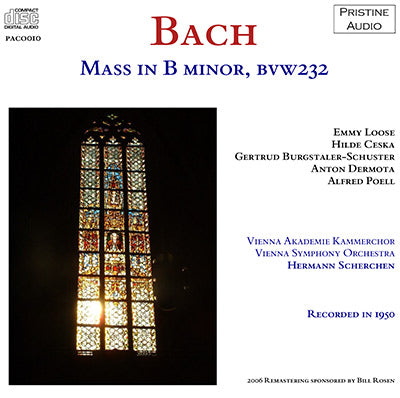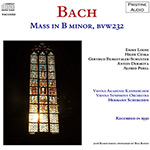
This album is included in the following sets:
This set contains the following albums:
- Producer's Note
- Full Track Listing
- Cover Art
Scherchen's 1950 classic Bach B Minor Mass
When Bill Rosen's Bach LPs arrived it was with some trepidation that I
began the restoration. Bill had generously offered to start a
sponsorship scheme with a recording which is perhaps the most dear to
him. I took the first LP out of its polythene sleeve, carefully cleaned
it and placed it on the turntable, apprehensive of the six sides I had
promised to work on.
The stylus lowers gently onto the treasured
vinyl and the opening Kyrie eleison begins. I am horrified. The sound
is dreadful - as if the master tape had been thoroughly mangled, chewed
and spat out by a particularly unruly tape machine (which I suspect it
had). The prospect of two hours of this is terrifying.
And then,
after about 36 seconds, a silence - a pause - and the orchestra comes
in perfectly, and I breathe a sigh of relief. Although the condition is
to be revisited more mildly for a couple of seconds later in the same
side, there is otherwise no repeat of it.
It took me five days
of work, on and off, to correct those opening few bars to the degree you
can now hear. Had the entire recording been in a similar condition I'd
either be working on it still, or more likely locked up!
I
decided therefore to make the full 15'50" of this opening available as
our sample movement - I hope you'll enjoy it as much as both Bill and
now I do.
Andrew Rose
-
J. S. BACH Mass in B minor, BWV.232
Recorded in 1950
Released as 3 Westminster LPs: WL 50-37 - 50-39
Duration: 2hr 4:41
CD1: 64:06 CD2: 60:35
Emmy Loose (soprano)
Hilde Ceska (soprano)
Gertrud Burgstaler-Schuster (contralto)
Anton Dermota (tenor)
Alfred Poell (bass)
Vienna Akademie Kammerchor
Vienna Symphony Orchestra
conductor: Hermann Scherchen
Bill Rosen's Review
None, for me, has ever touched the infinite the way his does
My
grandmother gave me $15 in 1951 for my 19th birthday. She told me to
spend it on some good music. I was in college at the time and I rather
brashly asked the choir director, "What is the greatest piece of music
ever written?" With not much hesitation, he answered, "The Bach B Minor
Mass". At the time, I was very much into classical music, but I was
quite unfamiliar with Bach or Handel or the Baroque style. Nonetheless, I
went to the largest record dealer in Los Angeles and bought the
Westminster recording of Hermann Scherchen's performance of the B Minor
Mass.
When I played it, I was horribly disappointed. I couldn't
make head or tails out of it. I thought the music was harsh, unmelodic,
weird. I was tempted to return it. I particurly hated the long, opening
Kyrie. The orchestration with the harsh trumpets I thought primitive and
brutal. I made several more attempts, but finally put the album away in
a drawer.
About six months later, our college (UCLA) chorus
began to rehearse the Mozart Requiem. I was utterly taken with the great
fugue (Kyrie Eleison) and its repetition at the end of the work. I was
so entranced with the music that I couldn't get it out of my mind. I
decided to take the Bach B Minor out and give it another listen and
suddenly I understood it and felt it. I played it over and over and I
could hear nothing else for a while (although we kept rehearsing the
Mozart). Since then (I was 20), the Bach B Minor Mass and especially the
opening Kyrie has always appeared to me as the acme of musical
spirituality. The first voice of the opening fugue has always seemed not
music, but a pulse of the universe.
In the ensuing 53 years I
have collected many B Minor Masses, many much more finely recorded than
the Scherchen. But none, for me, has ever touched the infinite the way
his does.
Reviewer: Bill Rosen

